 |
 |
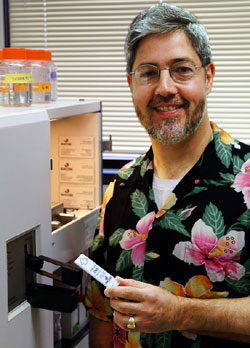
|
|
Jack Simpson, Ph.D., Protein Chemistry Laboratory, Science Applications International Corporation (SAIC – Frederick), Contractor for the National Cancer Institute (NCI), Frederick, Maryland
|
1. I chose this career because...
2. My typical workday involves...
3. What I like best/least about my work …
4. My career goals...
5. When I'm not working, I like to...
6. A principle to follow…
|
|
1. I chose this career because...
|
Back to Top

|
I chose to become a chemist primarily because of my high school chemistry and physics teachers. Both served as great examples of teaching through classroom demonstrations. In particular, I remember my chemistry teacher dropping elemental sodium into water and watching it catch fire. That was so cool! My physics teacher once demonstrated the triple point for water, where it exits as a solid, liquid and gas all at the same time. I just thought it would be neat to learn as much as my teachers knew. I’m still trying.
My father was also a great influence because he always encouraged me to finish school and get a job! My wife was patient enough to stick with me throughout all my years of graduate studies.
Graduate School
During graduate school, I became interested in analytical chemistry and mass spectrometry specifically. I remember the first time I stepped into the lab. The room was filled with this huge double-focusing mass spectrometer (see "My Typical Workday Involves..."). I was too scared to touch it at first. But I also realized if I learned to use it, I would always be able to get a job.
Mentors
Throughout my education and training, I had great scientific mentors. Each mentor taught me about a specific specialty such as mass spectrometry, natural products chemistry and biology. The knowledge and skills I learned from them helped prepare me to enter the work force.
Education
- Doctor of Philosophy, Analytical Chemistry, American University, Washington, D.C.
- Master of Science, Organic Chemistry, Texas A&M University, College Station, Texas
- Bachelor of Science, Chemistry, Louisiana State University, Baton Rouge, Louisiana
|
|
2. My typical workday involves...
|
Back to Top

|
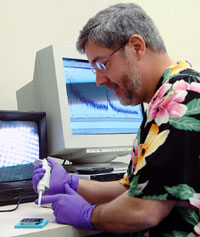
|
|
In the laboratory, Jack Simpson prepares to run a sample through the mass spectrometer for analysis.
|
My typical workday depends on the experiments that are planned. I am a bench chemist, so I spend most of my time planning and performing experiments.
Major Tasks:
- Making buffers and sample preparations for biomolecular interaction analyses such as protein-protein binding studies
- Purifying samples and preparing them for mass spectrometry studies
- Analyzing samples on the instruments in order to characterize proteins and their interactions
Coming to the NCI
I came to my current position at the NCI when my former lab closed down. The new job gave me an excellent opportunity to learn about protein chemistry, and to study biomolecular interactions using a new analytical technique called surface plasmon resonance (see description below). In the past, I spent the majority of my career working with small molecules and drugs. My current position gives me the chance to work with much larger molecules (proteins, deoxyribonucleic acid (DNA), virions) and to study their complex interactions.
Specialized Techniques I Use:
- Surface Plasmon Resonance Spectroscopy (Biacore) – a technique I use to study the way two molecules bind together, such as an antibody with an antigen, or a drug and cell protein interaction.
- Mass Spectrometry – a technique I use to determine the molecular weight of intact molecules, such as drugs, proteins and DNA. It can also be used to identify and sequence proteins, and monitor drugs in body fluids. For instance, all drug testing for the Olympics is performed using mass spectrometry.
Research Collaborations
As our laboratory provides contract services for the NCI, we collaborate with NCI staff on several long-term research projects. For example, one project focuses on the binding of neutralizing antibodies to the Human Immunodeficiency Virus (HIV), which is the virus responsible for Acquired Immune Deficiency Syndrome (AIDS). Another project involves the development of new techniques for mass spectrometry analyses. We report the results of our analyses to our NCI collaborators.
Presenting Scientific Results
I present data from our research projects at national meetings and publish those results in peer-reviewed journals. In addition, I routinely give seminars internally at the NCI. The ability to clearly explain your results to others is very important in the sciences. Public speaking is a valuable skill to hone.
|
|
3. What I like best/least about my work …
|
Back to Top

|
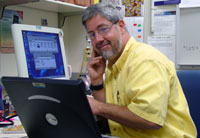
|
|
Jack Simpson performs administrative tasks at his desk.
|
What I like best about my work is that very little of what I do is routine. Each new project and set of samples can be a research project in itself.
What I like least about my work is the administrative duties that take time away from doing real science. For example, I have to prepare progress reports and annual reports. There is a lot of redundancy in the reporting paperwork.
|
|
4. My career goals...
|
Back to Top

|
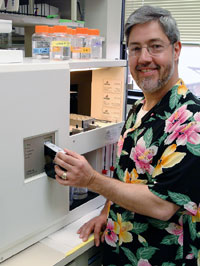
|
|
Jack Simpson performs surface plasmon resonance spectroscopy (Biacore) analysis to study molecule binding.
|
My career goals are to:
- Make a significant contribution to the cure or prevention of a disease.
- Direct my own laboratory – I have done this before and enjoy directing the overall laboratory research, and guiding the careers of young scientists working in the lab.
My first goal far outweighs the second!
|
|
5. When I'm not working, I like to...
|
Back to Top

|
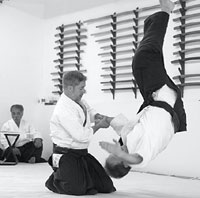
|
|
Jack Simpson teaches his students the Japanese martial art, Aikido.
|
When I’m not working, I like to teach and train in the Japanese martial art of Aikido. I operate a small dojo or training hall, and have been training in the martial arts for close to 25 years.
In addition, I enjoy scuba diving and traveling. I have visited various islands in the Caribbean, Mexico and Greece. Most recently, my wife and I dove off the coast of the Cayman Islands.
Finally, I enjoy spending time with my wife at home, gardening, playing guitar (poorly) and sometimes taking her on surprise “dates”.
|
|
6. A principle to follow…
|
Back to Top

|
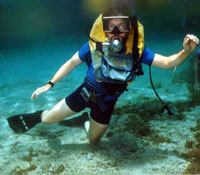
|
|
| |
An avid scuba diver, Jack Simpson swims off the coast of Rhodes, Greece, in the Aegean Sea.
|
When I decided to pursue chemistry, I made a very clear decision to try to utilize chemistry to help people, specifically, to try to help develop drugs to cure diseases. This principle has been my main focus and has led me throughout my career.
|
|
|
|
 |